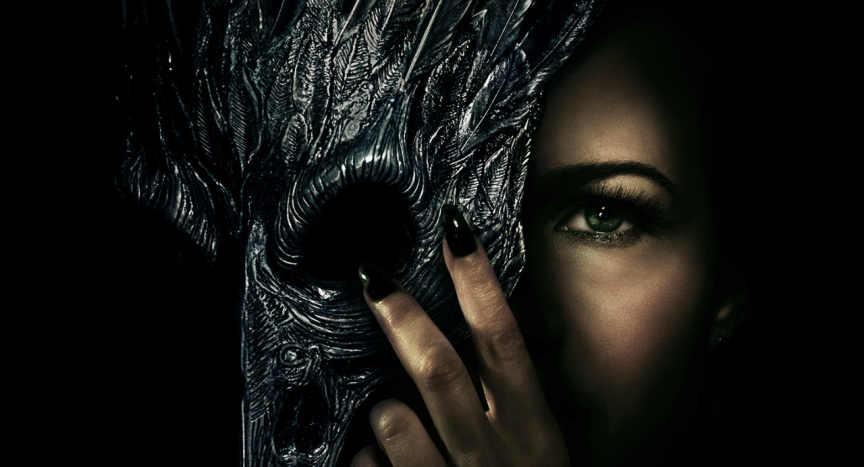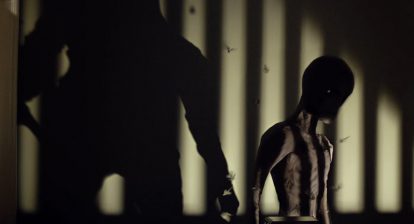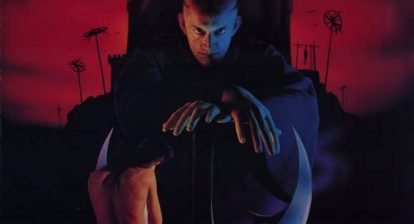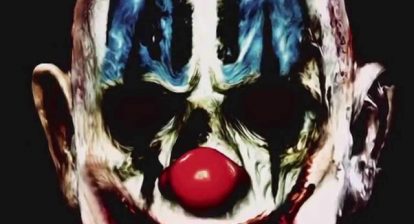Edgar Allan Poe is a name that everyone knows. But even though everyone has heard the name, most haven’t read the stories, and everyone that is familiar with the movie adaptations, is most likely dead and buried. Was that good Edgar Allan Poe prose? I thought so. The Fall of the House of Usher is the newest Mike Flanagan joint on Netflix. When it comes to adapting famously successful horror authors, Flanagan is as good as it gets. The Fall of the House of Usher isn’t necessarily a straight up adaptation of a Poe story, but more so a modern tragedy told through the Edgar Allan Poe language, with an abundance of direct and low-key references. Each of the eight episodes of the series is named after, and loosely based on works from Poe. So basically, any Poe fanatic is going to gobble this up.
Even if you are not a Poe fanatic, The Fall of the House of Usher is an entertaining and terrifying story of a modern pharmaceutical magnate and his privileged, evil, and spoiled rotten family. Blending the works of Poe with such a contemporary story seems tough in theory, considering how gothic and, for a lack of a better word, colonial Poe’s work is. But in reality, The Fall of the House of Usher modernizes Poe’s work so spectacularly, and serves as both a great adaptation and an accessible and contemporary story that all audiences will enjoy…
A good place to start is with past Poe adaptations on screen. Interestingly enough, Edgar Allan Poe might be the first horror author adapted to the big screen, literally. Well, not exactly an adaptation of Poe’s work, but Poe himself was portrayed on screen in the silent film titled Edgar Allan Poe from D.W. Griffith. Spanning the totality of Hollywood’s Golden Age, meaning the 1920s through the 1950s, Poe’s work was adapted ad nauseam, primarily by Universal Studios, adjacent to the infamous Universal Monster Universe run. From Bela Lugosi to Vincent Price to Boris Karloff, Poe’s work was performed by the best in the business. But once the 1960s rolled around, and Old Hollywood faded away, Poe’s work faded in the mainstream as well. Even though filmmakers like Roger Corman and Lucio Fulci were tackling the adaptations, the work of Edgar Allan Poe became sort of irrelevant in mainstream filmmaking. Even though the direct adaptations came to a halt, the references to Poe’s works were running rampant across the movie landscape. His stories and prose are familiar enough with the general public to be one of the most famous authors of all time, especially in horror. In the 2012 movie titled The Raven, starring John Cusack as Poe, we see a fictionalized version of Poe’s final days. That movie works quite well for me, but since that, there hasn’t been anything mainstream that is an adaptation of Poe’s work, until The Fall of the House of Usher…

Mike Flanagan is probably best known for his adaptations of Stephen King, which are all phenomenal, and even King is an enormous fan of Flanagan’s adaptations. What makes Flanagan so great at adapting King is that he has a profound respect and understanding of the source material, and really understands how to blend his filmmaking style and approach while fusing that with being faithful to the source material. King’s storytelling is obviously terrifying and dense enough that it seems easy to adapt, but there have actually been so many King adaptations that have failed miserably, and the best of all, Stanley Kubrick’s The Shining, is reviled by King himself. Flanagan succeeded at adapting these works of Stephen King while staying true to his stylistic approach to filmmaking, which makes Flanagan the perfect filmmaker to tackle Edgar Allan Poe.
Back in 2019, Flanagan adapted Doctor Sleep to the big screen, which is the sequel to The Shining. Flanagan’s approach to this was simple, yet seemingly impossible to accomplish, and that was to stay true to the source material of the novel, while also fusing that with being a sequel to Stanley Kubrick’s The Shining. Because Flanagan was clearly such a fan and had such a good understanding of both works, he was able to walk that tightrope and make a worthy sequel to both the novel as well as the Stanley Kubrick film. The Fall of the House of Usher mimics this approach in my opinion, by blending the works of Edgar Allan Poe with a modern story that Flanagan wants to tell. Flanagan somehow weaves the classical horror elements and language of these Poe stories into a modernized family tragedy that is satirical, funny, and horrifying. Poe’s work is most certainly not to be confused with anything that would be published in National Lampoon, but Flanagan somehow mixes the Gothic horror elements with a family satire, and it is fantastic, so let’s get to it…
The Fall of the House of Usher is centered around the patriarch of the Usher family, Roderick Usher, played by Flana-verse usual Bruce Greenwood (Gerald’s Game) in the present, and Zach Gilford (Midnight Mass) in the past. Roderick Usher is the CEO of the Fortunato Pharmaceutical empire. Roderick is a shameless billionaire pharma-magnate with a family that is just as shameless and despicable as he. Usher’s empire includes all of his heirs, being his eclectic group of children, grandchild, and his sister, Madeline, played by Mary McDonnel (Donnie Darko) in the present, and Willa Fitzgerald (Reacher) in the past.
The Fall of the House of Usher focuses solely on the rise and fall of the Usher family, bouncing back and forth between the past and present, the beginning and the end of the bloodline. Roderick Usher has six children, all of whom are revealed to have been killed in mysterious ways during a short window of time (over the span of a few weeks) where the story of the present is taking place. Each episode accounts for the death of one of these kids per episode, told through the lens of various classic Poe stories. The bridge between the story being told in the present and the past is through the perspective of Roderick Usher in the present day, recounting and lamenting over his responsibility for the death of his kids, alone in his childhood home (which he owns just to let rot) in the middle of the night with an old acquaintance, Assistant United States Attorney, C. Auguste Dupin, played by Carl Lumbly (Doctor Sleep), who has been trying to bring Roderick and the Usher Empire to justice for the astoundingly high amount of deaths caused by irresponsible and dangerous pharmaceuticals being pushed by Fortunato for years and years.
Why Roderick is telling his life story, as well as what happened to his kids, to Dupin is a mystery until the very conclusion of the series, but it serves as a great point of narration for each episode, and also contains some of the best scenes of the series, one being the spectacular conclusion…
Like I had previously mentioned, the Usher spawn are an eclectic group. Roderick’s heirs include Frederick, played by Henry Thomas (Ouija: Origin of Evil), Camille, played by Kate Siegel (Hush), Leo, played by Rahul Kohli (Midnight Mass), Tamerlane, played by Samantha Sloyan (Midnight Mass), Victorine, played by T’Nia Miller (The Haunting of Bly Manor) and Prospero “Perry”, played by Sauriyan Sapkota (The Midnight Club). All of these character names, as well as all character names from the series, are pulled directly from various characters from the works of Poe. Which is the same approach Flanagan took when making The Haunting of Hill House. The family dynamic between all of the Ushers is very Succession-esque, which is an obvious and overused comparison, but an accurate one.
The “legitimate” children, Frederick and Camille, are the primary heirs, while the remaining kids are referred to as the “bastards”. But being a bastard himself, Roderick does not discriminate towards any of his children, and all are very much welcome under his golden umbrella. Each Usher child has debilitating character traits, and each of their subsequent deaths are direct results of those flaws. Their deaths are almost like atonement, for using the privilege they are given in negative and despicable ways. The only seemingly good apple on the tree is Roderick’s granddaughter, Lenore Usher, played by Kyliegh Curran (Doctor Sleep). Lenore is the daughter of Frederick and his wife, Morella Usher, played by Crystal Balint. Each of these performers has worked with Flanagan previously, which I find to be an odd choice considering the potentially distracting fatigue that an audience might feel towards each performer being consistently associated with Flanagan’s work, but I actually find the ensemble nature of it to be charming…

The Flana-verse really does feel like a traveling ensemble that goes from project to project as a unit. There have been plenty of performer/filmmaker tandems that frequently work together, but for an entire cast to be featured repeatedly in roles that are never similar is a very underrated quality of Flana-verse projects. Each performer is given plenty of meat to chew on, and the monologues run rampant in The Fall of the House of Usher, almost excessively so. But each performance is dense enough to carry each scene with an emotional weight that will resonate with an audience.
The Usher family is despicable, and with that usually comes annoying characters, but each character is interesting and entertaining enough to ensure we enjoy watching them die, laughing at their eccentricities, and feel no obligation to muster any sympathy for them. Each performer brings a human element that anyone can relate to, while also hamming it up with tons of energy. The combination of the energy brought on by the performances with the classically Gothic nature of the Poe stories makes for a real pleasure to watch.
Not to be forgotten, outside of the Usher clan, are the performances from Mark Hamill (Star Wars), playing family attorney/fixer Arthur Pym, and of course Carla Gugino (Gerald’s Game), as Verna, who is a stranger to the family but also connected with them directly in so many ways, particularly with their deaths. Hamill and Gugino give, in my opinion, the best performances of their careers, and are the backbone of this series, along with the star of the show, Bruce Greenwood, who is the darkly complex heartbeat of the program, and real tone setter of the story as a whole…
The story of The Fall of the House of Usher itself is actually quite simple. The rise and fall of a dynasty. What makes this series so special is that the overarching themes of greed and selfishness are so prevalent both in each individual episode, with each character, but also the Roderick Usher story of his rise and fall. This series attacks the impact that one person and their decisions can have not only on their family, but also the world.
Roderick’s intent as a young man was to “change the world”, with his sister Madeline by his side. Roderick and Madeline were born as bastards of a pharmaceutical magnate, William Longfellow, CEO at the time of Fortunato. Roderick and Madeline were dead set on inheriting the family company after the (confusing) death of Longfellow when they were teenagers, and stopped at virtually nothing to attain this goal, making a deal with the devil, so to speak, and putting their greed and ambition above all else, including their own family.
Across history, these billionaire influential magnates seem to not only have disregard for the well-being of their family, but also the well-being of the general public, and The Fall of the House of Usher is clearly interested in exploring that obvious moral quagmire and the resulting fallout. People that are so driven, like Roderick and Madeline, will stop at nothing to achieve what they want to achieve, and by doing so leaving a wake of death and despair.
The pharmaceutical world is a f**ked up one, and a hot topic issue in modern times for sure. Not only is the pharmaceutical scene complicated in regards to legal gray areas, moral ambiguity, and general malcontent from consumers, but the repercussions of the damage caused by greedy decisions made by those in power at these empires has a real impact on so many in regards to drug overdose and addiction.
Addiction is a topic that Flanagan has repeatedly explored, this time from a different angle, focusing on the architects being the drugs instead of the abusers themselves. The abusers are minimized to just faceless people, and in one of the most visually impressive moments of the show, Roderick is looking out the window on the top floor of his company’s skyscraper, and instead of raindrops is faceless victims of the dangerous and addictive painkiller that he has been pushing “legally” for years raining down right in front of him, a fascinating visual that while being on the nose, really worked, and looked cool as hell.
The Fall of the House of Usher is obviously a horror show, but it is exploring really dark themes of addiction and remorse, or lack thereof. Yes, it can be preachy at times, but to be able to weave this very contemporary tale of a family’s rise and fall with works of a nineteenth century horror novelist is astoundingly impressive…
Did You Know? Wicked Horror TV Has Classic and Independent Horror Films Available to Stream for Free!
To conclude, the technical proficiency of Flanagan is really like no other. He does not have many contemporaries in the horror genre especially who can stage and execute a scary or emotional or expositional scene like he can. Although of course it is unfair to give Flanagan all of the credit, The Fall of the House of Usher was not exclusively directed by Flanagan. Michael Fimognari, Flanagan’s primary cinematographer going all the way back to Oculus in 2013, also directs half of the episodes of The Fall of the House of Usher. Who better to share directorial duties with Flanagan than the other man behind the camera for ten years now.
To extend praise further, the writing team, along with Flanagan, also does a fantastic job weaving in so many Poe references while keeping the story grounded in contemporary times. The seamlessness of switching back and forth between past and present, and slowly revealing key details and secrets as the series progresses, is expertly handled. All episodes of the show are interesting and unique to themselves, but also tie together the overarching story so well. There is hardly a wasted second throughout, and the blend of Poe’s work with modern horror storytelling makes for a very accessible show for not just fans of Poe, but also those less familiar with the work of Poe. It’s killing two ravens with one stone, Nevermore…
Wicked Horror Rating: 9/10
The Fall of the House of Usher is available now on Netflix.







